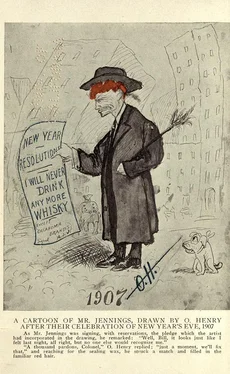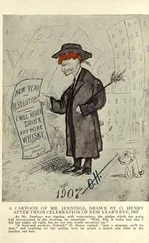Al Jennings - Through the Shadows with O'Henry
Здесь есть возможность читать онлайн «Al Jennings - Through the Shadows with O'Henry» весь текст электронной книги совершенно бесплатно (целиком полную версию без сокращений). В некоторых случаях можно слушать аудио, скачать через торрент в формате fb2 и присутствует краткое содержание. Жанр: Биографии и Мемуары, на английском языке. Описание произведения, (предисловие) а так же отзывы посетителей доступны на портале библиотеки ЛибКат.
- Название:Through the Shadows with O'Henry
- Автор:
- Жанр:
- Год:неизвестен
- ISBN:нет данных
- Рейтинг книги:5 / 5. Голосов: 1
-
Избранное:Добавить в избранное
- Отзывы:
-
Ваша оценка:
- 100
- 1
- 2
- 3
- 4
- 5
Through the Shadows with O'Henry: краткое содержание, описание и аннотация
Предлагаем к чтению аннотацию, описание, краткое содержание или предисловие (зависит от того, что написал сам автор книги «Through the Shadows with O'Henry»). Если вы не нашли необходимую информацию о книге — напишите в комментариях, мы постараемся отыскать её.
Through the Shadows with O'Henry — читать онлайн бесплатно полную книгу (весь текст) целиком
Ниже представлен текст книги, разбитый по страницам. Система сохранения места последней прочитанной страницы, позволяет с удобством читать онлайн бесплатно книгу «Through the Shadows with O'Henry», без необходимости каждый раз заново искать на чём Вы остановились. Поставьте закладку, и сможете в любой момент перейти на страницу, на которой закончили чтение.
Интервал:
Закладка:
With the fervor of hero-worshipers, Raidler and I acknowledged Bill Porter, the genius.
We decided to send the story to the Black Cat. There was in the prison at this time a cultured Frenchman, a banker from New Orleans. Through his sister, Porter's stories, bearing the New Orleans address, were sent to the editor.
When "The Christmas Chaparral" was sent out, Billy and I could hardly wait for the weeks to go by. We were sure it would be accepted at once. At least $75 was the price we thought it ought to bring. It came back.
Years later I peddled my own story from editor to editor. Never did I feel the angry spasm of disappointment that seized me when Porter's great story was rejected.
I knew that he, too, was filled with a bitter regret. He had counted on the money. He wanted to send a little present to his daughter, Margaret. Now she would have to wait. It cut him to the quick, this failure of his, as a father.
But he said very little when Billy handed him the package. We were so incensed against the publishers, of the magazines, we wanted him to blacklist them in the future.
"Colonel, the day may come when I can decline publication—at present I don't seem to have the deciding voice."
And he went back to his desk and wrote and wrote. He went back to the melancholy prison hospital, to the night patrol through the cell ranges, gathering his material, transmuting the gloom through the O. Henry alchemy into the sunny gold of his stories. Many of these he read to us in the stolen happiness of Sunday afternoons at the "Recluse Club.'*
CHAPTER XVII.
O. Henry; Bohemian; the Recluse Club in the prison; the vanishing kitchen; the tragedy of Big Joe; effect on O. Henry; personality of a genius.
Porter was a bohemian in heart, in soul, in temperament. Not the poser he had neither sympathy nor kinship with the temperamental quacks of the artistic world but a born original. He loved freedom and unconventional sociability. In this buoyant atmosphere he could warm up, whisper out his drolleries, forget. Even in the prison the whimsical vagabond in him asserted itself. He founded the
"Recluse Club."
Six convicts three of them bank-robbers, one a forger and two train-robbers, made up its membership. We met on Sunday in the construction office. And never a club in the highest strata of society had graver, brighter, happier discussion never an epicure's retreat served a more delicious menu than our Sunday repasts.
The embezzlers had been men of great wealth. They were educated and polished. It was a fitting environment to bring out the best in Bill Porter. He was king of that exclusive club.
It was a Sunday, three weeks after I had been transferred to the post-office, that I was invited to join.
"Slither over, colonel," Porter whispered to me. "I key will show $ou the way."
An odder initiation ceremony never was held.
Porter met me at the door of the construction office and with elaborate burlesque paid tribute to my accomplishments. "Here is a financier worthy to sit with the elect. The colonel kills with a deft equanimity equaled only by the finesse of Louisa in seasoning the gravy."
Louisa was the nickname given to the French gentleman sent to the Ohio penitentiary on a charge of embezzlement. He was dapper, swarthy, mannered like a prince—the chief clerk in the construction office and the man responsible for the magic kitchenette concealed behind the walls of the office.
Louisa was official chef of the "Recluse Club." He turned out mince pies and roast beef that would have made the eyes of Dives bulge with envy. He measured to the grain all his ingredients and he followed minutely the instructions in a big cook book.
If the prison had suddenly been changed into paradise it would have seemed no more miraculous than the scene in this improvised banquet room. A fairy table, decorated with wild flowers and set for six, was laden with all manner of delicacies—olives, radishes, sugar, cream, white bread, lettuce, tomatoes.
In an armchair sat the little, rotund banker from New Orleans—the one who had accosted me the day I transferred myself to the cell in Bankers' Row. He was such a sputtery, rasp-voiced, punctilious trifle, Porter could not abide him. Billy Raidler was also sitting in comfortable grandeur. These two were exempt from labor—Billy because he could not walk alone; Carnot because he was old and fussy as a fat, spoiled baby.
Ikey slippered from wall to wall, his ear tuned for the sound of the guard's approach. The club and its opulent layout was distinctly against prison rules.
At a moment's signal, gas stove and its range could be hidden out of sight. Louisa was an architect and draughtsman.
A false wall had been built and the kitchenette with full equipment was hidden like a long telephone booth behind it. It was stocked with silverware, napkins, flavoring extracts, flour and every necessity, enough in fact, for a small hotel. All had been stolen or bargained from the head clerks in other shops and from the chief cook in the kitchen.
Louisa dodged from behind the door, a great dish cloth tied about his waist.
"Dinner is served, gentlemen. Make yourselves at home."
It was Bill Porter's turn to wait on table. Bill in all his buoyant sunniness brought on the roast beef that gala Sunday. It seemed to give him a whimsical satisfaction to wait on Raidler and me.
"Colonel, I feel more at home holding the tray for you than I would have felt holding the horses that day," he whispered in my ear.
Louisa, the chef, carved. I'll remember to my last breath the menu. It was the first good meal I had had since I was thrown into jail to await trial three years before.
We had a tomato soup that was the pride of Louisa's art. He boasted of the pinch of soda added to keep the milk from curdling. And there was corn and green peas and roast potatoes, a mince pie and a cold bread pudding made with raisins and currants.
I've given that recipe of Louisa's to every woman I ever met. Not one of them could turn out the delicacy as the chef of the "Recluse Club" did it.
Porter had drafted the rules of the club. A copy lay at each place with the little cartoons he made of us. Funny little verses were scrawled under the figures. Every Sunday we had different place cards.
Porter's raillery was boundless. Raidler and I were the only ones to acknowledge ourselves guilty. Louisa, Porter, Ikey and old Carnot were all victims of circumstances. They were touchy about their pasts. And so the cartoonist drew them as cherubs, friars, lilies without stain and the dewdrops glistening on their white sheafs.
Not one of those men, and they were Porter's equals at least in social position, dared to take liberties with him. I think they held him in a sort of awe. His dignity was invulnerable. Old Carnot would have liked the same respect. He never got it. Billy Raidler never tired of puncturing his pompous self-esteem. But Billy would have died rather than wound Bill Porter.
Old Carnot did not want any one even to mention the fact that he was in the penitentiary. He would bluster and sputter when any one spoke of him as a convict. Every Sunday there was an argument about it. Raidler, just for the impish love of teasing the old man, would open it.
"Now, Mr. Carnot," he would say, "my esteemed friend, Bill Porter, and I propose to found a union of ex-convicts as soon as we are discharged. We wish you to join."
Carnot would get red, champ his teeth together and rustle in his chair.
"Don't speak of it. I don't wish you to mention it." His pursy lips sent out a shower, I ducked.
"Colonel, I don't know why you are contorting your face and capering about so," the old man turned on me.
"Well, by God, your honor, I don't want to get drowned."
Читать дальшеИнтервал:
Закладка:
Похожие книги на «Through the Shadows with O'Henry»
Представляем Вашему вниманию похожие книги на «Through the Shadows with O'Henry» списком для выбора. Мы отобрали схожую по названию и смыслу литературу в надежде предоставить читателям больше вариантов отыскать новые, интересные, ещё непрочитанные произведения.
Обсуждение, отзывы о книге «Through the Shadows with O'Henry» и просто собственные мнения читателей. Оставьте ваши комментарии, напишите, что Вы думаете о произведении, его смысле или главных героях. Укажите что конкретно понравилось, а что нет, и почему Вы так считаете.











